As was foretold, we've added advertisements to the forums! If you have questions, or if you encounter any bugs, please visit this thread: https://forums.penny-arcade.com/discussion/240191/forum-advertisement-faq-and-reports-thread/
Options
[Retrospective]Godzilla: Half Century War
Bobby Derie Registered User regular
Registered User regular
 Registered User regular
Registered User regular
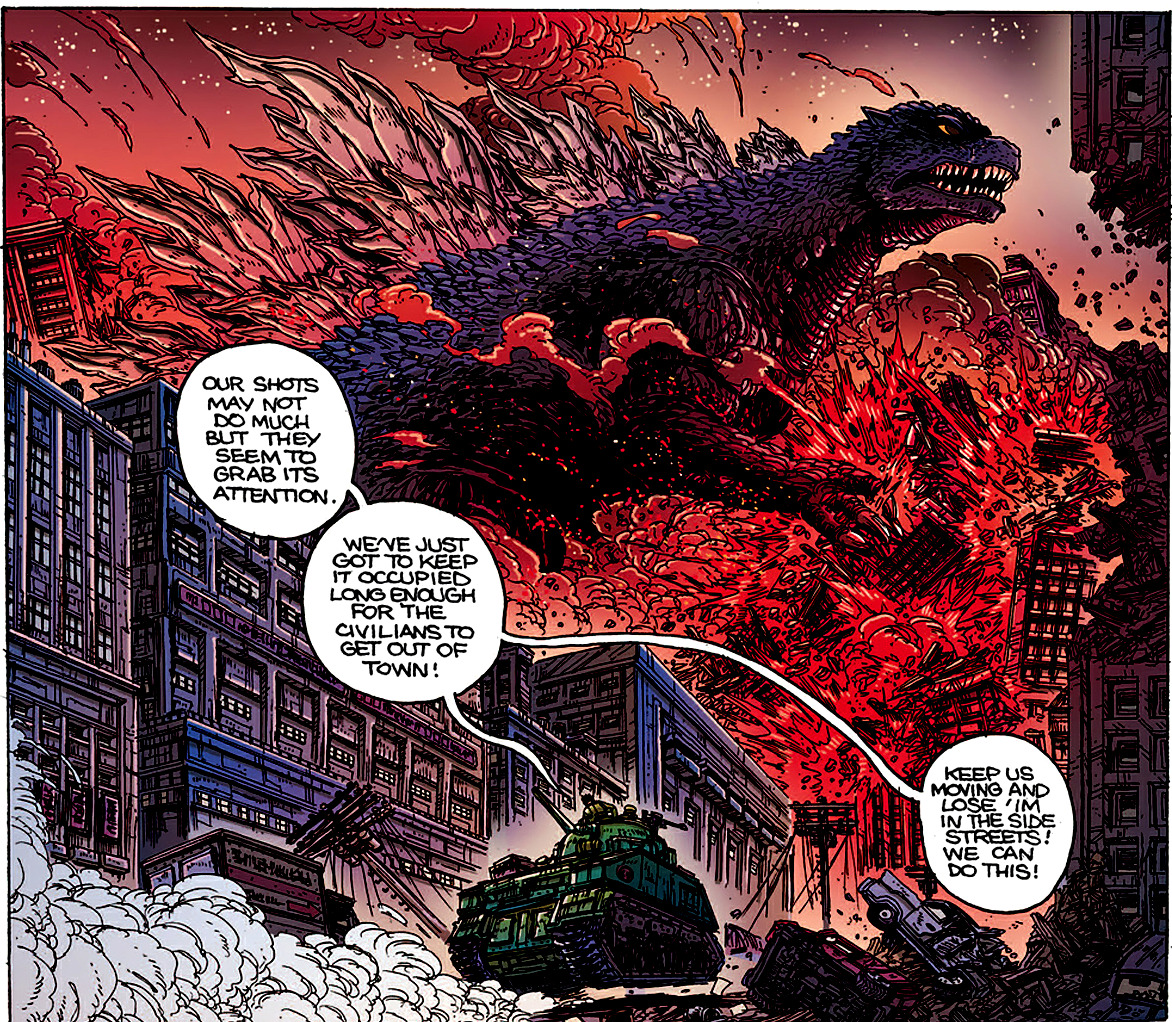
One of these days, I will probably do a retrospective where I rant about some bit of comics that I intensely disliked, such as Zero Hour. One day, too, I shall probably do a retrospective gushing about a comic you've actually heard of, like the first part of Teenage Mutant Ninja Turtles. I may even go back and look at something controversial, which I once praised or reviled and then changed my mind about, like the death of Stephanie Brown.
But for now, because nobody has requested anything else and nobody can stop me, I'm going to talk about a comic that you all should have read, instead of whatever other pap was coming out in 2012/2013. It's the last time I'm going to do a retrospective on something this recent - I think I'm going to make sure any others are at least 10 years old - but I'm in the mood to talk about this one.
I'm going to start out with saying that I remember back when Godzilla was published by Marvel Comics, and you could fish these issues out of the dime bins.

Even back then, it was kind of hokey. It's not like Marvel didn't have their own giant lizard in the form of Fin Fang Foom, not counting other non-recurring megasaurs. This was before the 1985 film reboot of Godzilla, and the film franchise itself was well into the era of silliness. There was an animated cartoon with "Gadzooky" for crying out loud. Twisted Kaiju Theatre made a running gag about Godzilla's pot-smoking son.
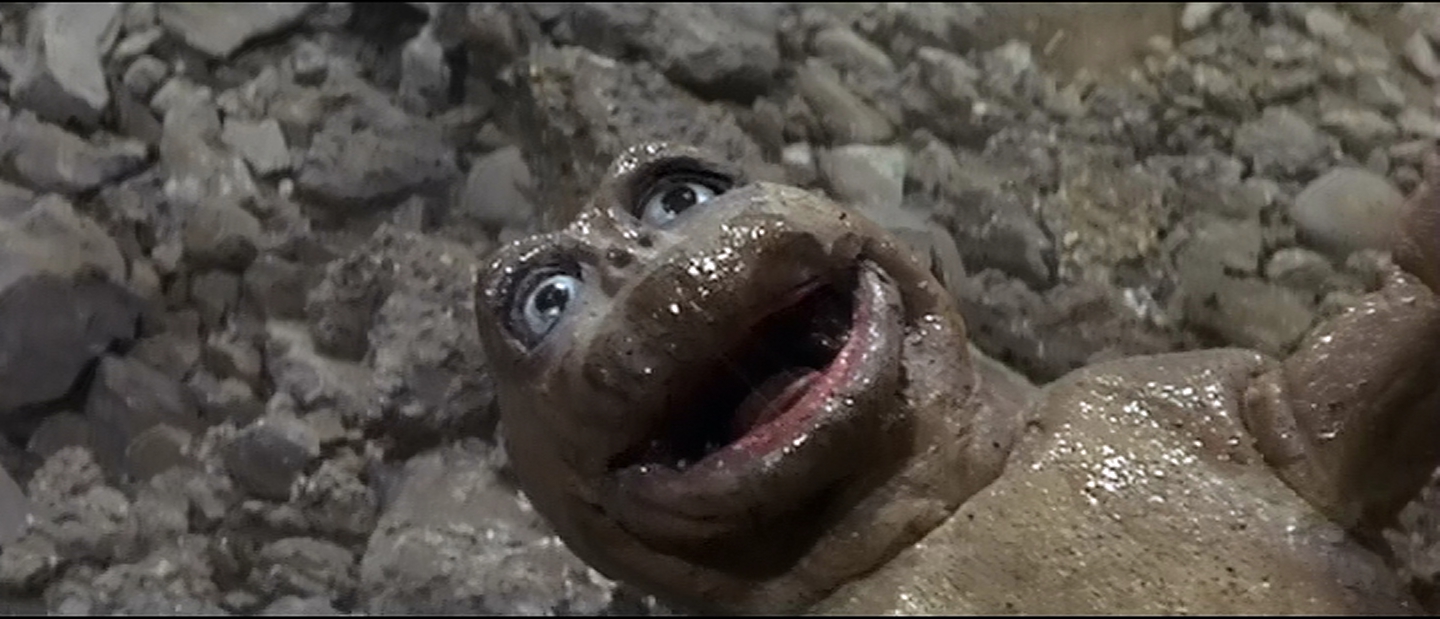
It's a giant radioactive lizard. That is simultaneously brilliant and retarded. Even if you aren't a diehard fan of Godzilla - and I have to admit, it's been years since I sat down and willingly watched any of that particular brand of giant monster movie - the appeal is automatic. Godzilla has a status comparable to the classic Universal monsters. You don't have to have even seen any of the movies to get the gist of the plot - simple cultural osmosis is enough. People know what they're going to see when they go to a Godzilla movie. Giant monster attacks Tokyo. Boom. Done.
On the other hand, you have to look at what underlies the Godzilla mythos. Godzilla is fallout. He's the boogeyman of the atomic age. He's the bombing of Hiroshima and Nagasaki, he's the invisible dangers of radiation made manifest. What is more, he's completely uncontrolled - a force of nature, a backlash. There's no political agenda that accompanies Godzilla; he's a hurricane with scales. To fight him is almost fruitless...but you can fight him, and that ties into the other aspect of it, especially for the Japanese. Godzilla is a target and an excuse for militarism. At the end of World War II, the United States made it a condition that the Japanese could not have a military - and they still don't; the Japanese Defense Force is nominally a police body. All the weird super-science weapons being brought against Godzilla - this is playing into the Japanese fantasy of re-armament. Not because they want to start WWII again, but just because it is an invisible restraint imposed upon them. And Godzilla - this terrifying force - is the excuse for rearmament. It's like if they could shrink you down into the size of a blood cell, gave you a rifle, and told you to go kill the AIDS virus by hand.

I would like to take a moment to pimp James Morrow's excellent novel Shambling Towards Hiroshima, which is a sort of alternate-universe take on the concept that still manages to hit all the right marks.
Still, while I do like Godzilla, I'm not such a fanboy that I actually buy a lot of Godzilla comics. I had actually skipped the entire IDW Godzilla line of comics as just another nostalgia-driven licensed property that I didn't have much interest in, like Dejah Thoris and Zorro. But then I saw it was written and drawn by James Stokoe.
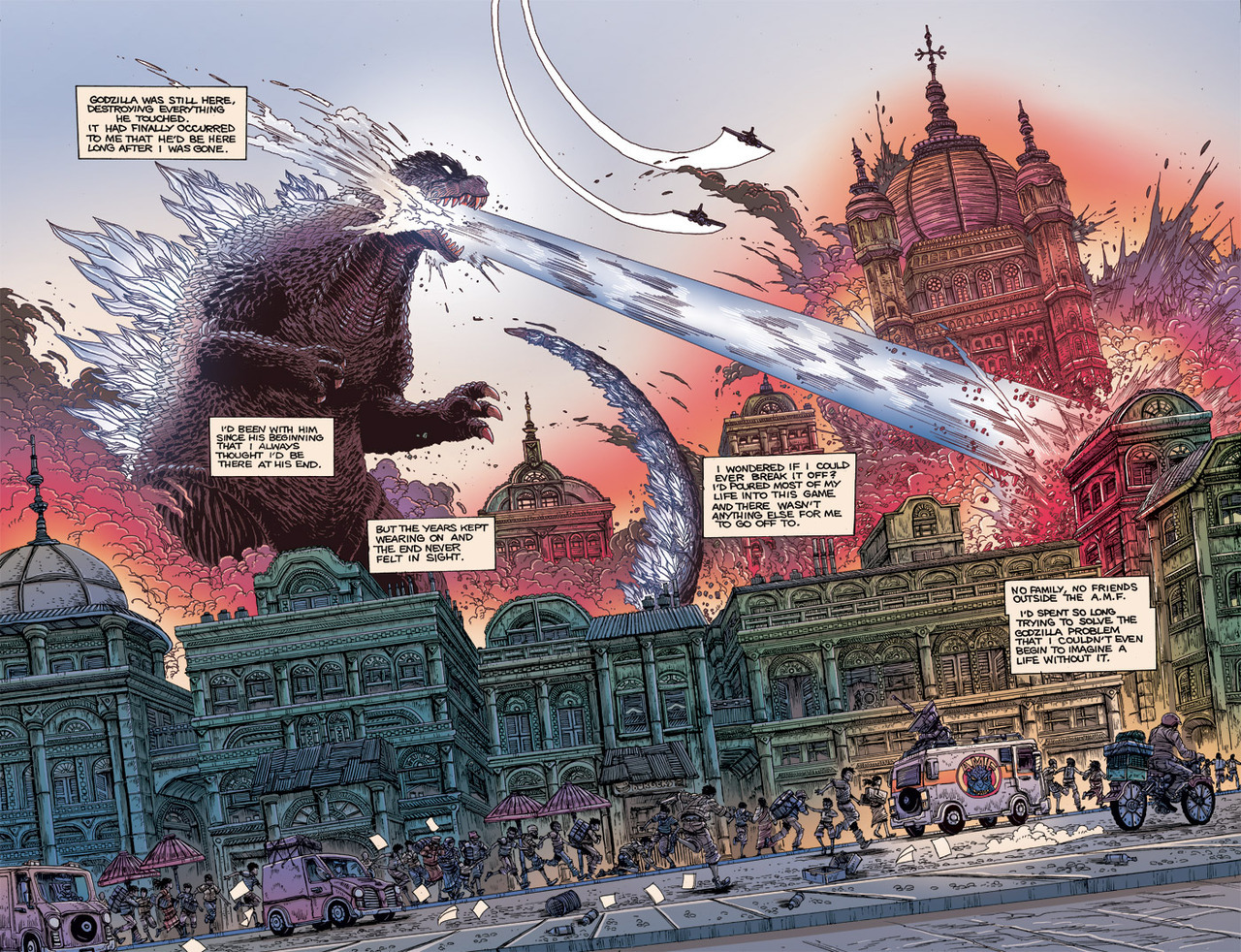
I'm going to go out on a limb and declare that James Stokoe is one of the greatest comic writer/artists of our era. I don't know if he's ever going to get the recognition he deserves - but I think that in twenty or thirty years the "big names" of this era will largely have passed, like popular novelists, and little indie guys with talent, skill, and cojones like Stokoe, Giannis Milonogiannis, Brandon Graham, Ladronn, and Steve Niles are going to be recognized as the real movers-and-shakers pushing the medium a little.
So, I'm a complete Stokoe fanboy and picked up the comic for that reason. It is a thing of beauty.

Running for four issues, Godzilla: Half-Century War is its own self-contained little continuity. You don't need to worry about having read any other comics, you don't need to worry about having seen any of the movies. This is, in fact, better plotted than most of the Godzilla movies, including (especially) the last one. It manages that feat by doing an interesting trick: obeying the #1 rule of Godzilla, and disobeying the #2 rule of Godzilla. Let me explain.
The #1 rule of Godzilla is that the reason people are there is to see Godzilla. It's like Transformers; the human's aren't so much an afterthought, as an unfortunate necessity, like the plastic wrapping on a DVD. Your main goal is to get through it as quickly as possible and get to the good stuff. It's fine to build up the anticipation by putting off the reveal for a little while, but by the end of the first act (if not sooner), Godzilla should appear - and Godzilla should remain the focus of the entire movie/film/whatever. No one cares about Sam Witwicky getting laid, or the emotional trauma of Japanese Civilian #3,012. We want to see Godzilla in action.
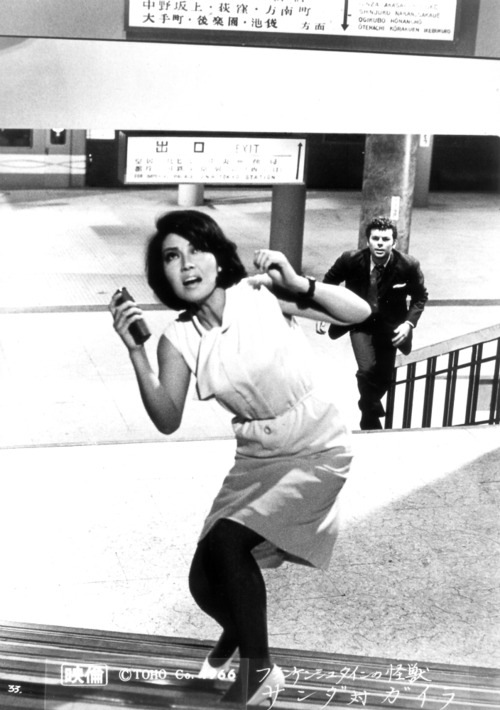
Look, it's a kaiju, crouching is not going to help.
The #2 rule of Godzilla is sort of like repeating it slower and in a louder voice: Godzilla is your main character, not the humans. And this is where Stokoe flips expectations, because right from the start, the main character is Murakami Ota, a lowly lieutenant in the Japanese Defense Force in charge of an ancient, battered tank in 1954...just when Godzilla rips through Tokyo for the first time. The thing is, while Ota is our perspective character, Godzilla isn't necessarily something he fights...it's a storm he survives.
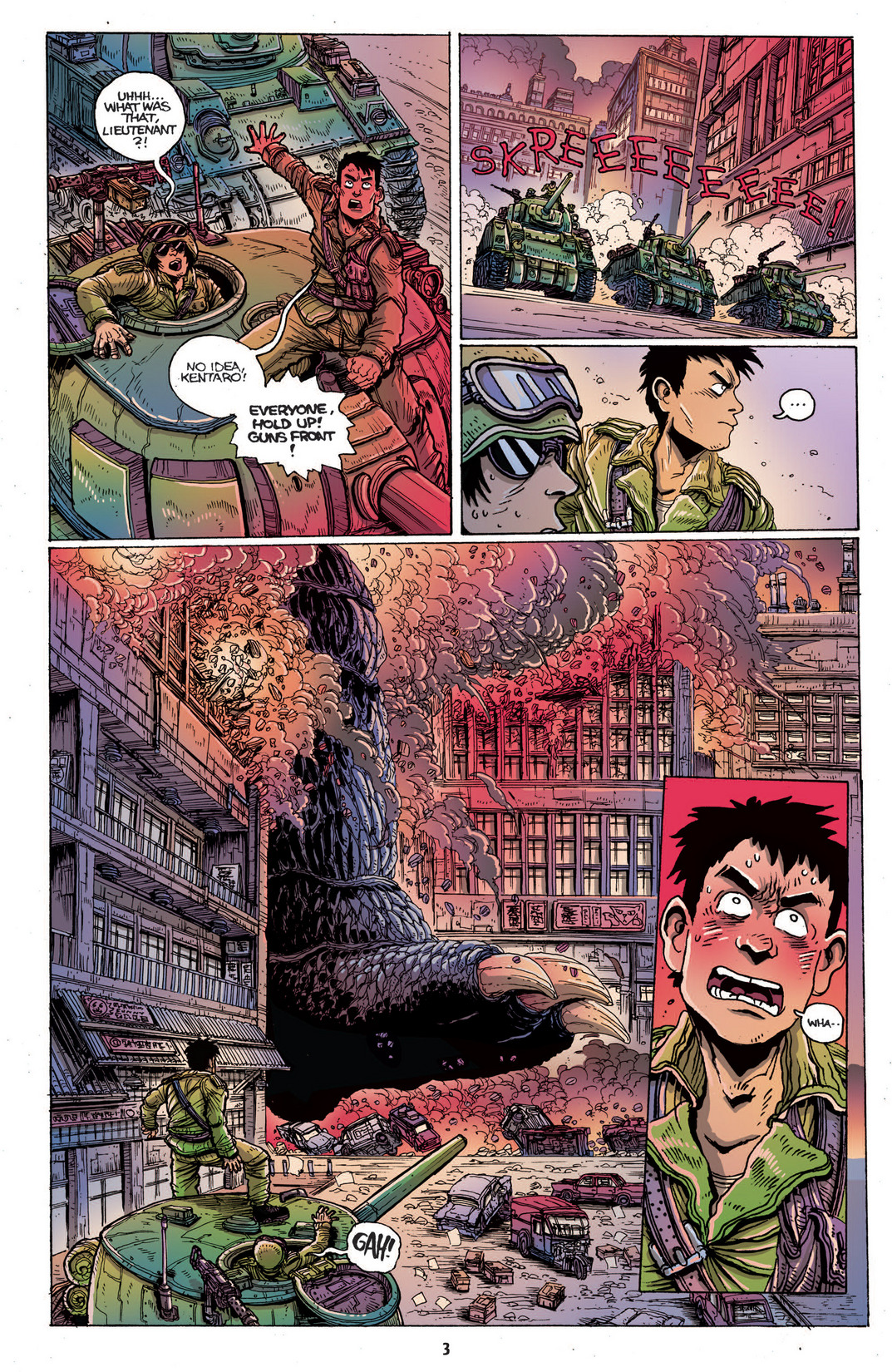
What we have, then, is exactly what the title promises us - a look at fifty years of unremitting warfare between men and Godzilla, as told through the eyes of Ota as he travels the globe with the specialized Anti-Megalasaurus Force (AMF). Ota doesn't often "win" in any conventional sense - even with giant masers, tanks, and other weapons - and his relationship with the giant atomic lizard sometimes borders on obsession. That is perfectly okay, because it keeps the focus on Godzilla, even when Ota isn't actively confronting him. It emphasizes the scale of the conflict - one tiny man against a giant beast - and how little we all are compared to the kaiju. Even in the final issue, when Ota is piloting a frickin' Mechagodzilla, he's trying to get some sort of recognition from the O.G. ... and failing, because he's still too small. Ota is an ant going up against a dinosaur, and the dinosaur doesn't even see him. It's a key concept that Ota finally learns to accept...and it's satisfying.
Killing giant monsters by itself isn't satisfying. The worst part of King Kong is the end, when the giant ape is so much street pizza. That's the thing with giant monster movies, you marvel at the size and strength and power of the things, you wonder that they can exist at all - like "A mountain walked, or stumbled" as Lovecraft put it - but once they're dead...they're just giant carcasses. It's like the bones in a museum. There's a sense of loss there.

There, I've spoiled Planetary #2 for you. Now go read it.
Even if it was humans vs. Godzilla, that would probably make for four gripping issues. But of course there's more to it than that, and I love James Stokoe for it. Each issue is basically complete in itself, taking decade-ish time skips so that issue #1 has Ota's first encounter with Godzilla and joining the AMF, and issue #4 is his last encounter. But in between we get this alternate continuity - upping the stakes each issue as Godzilla encounters not just new weapons, but new monsters.
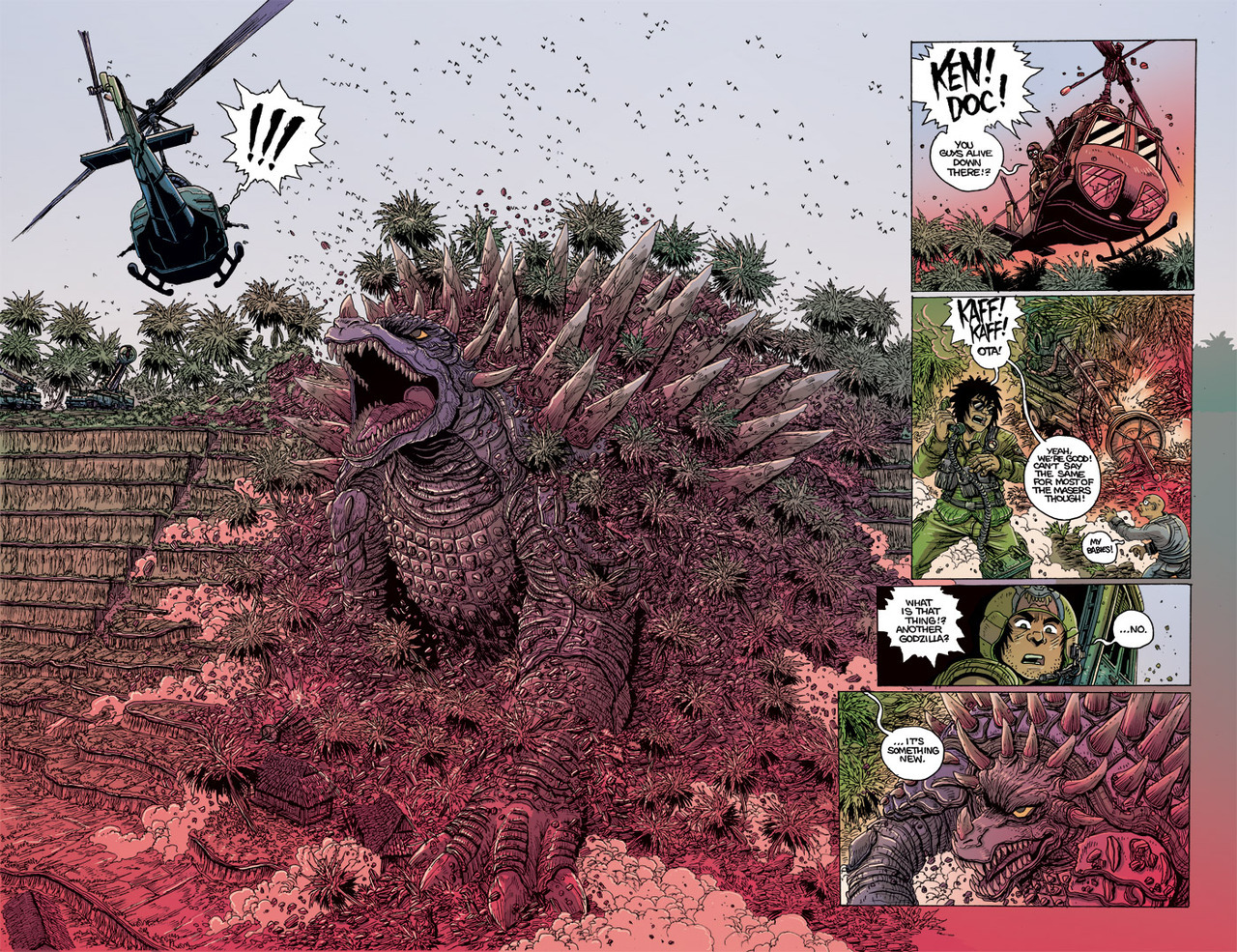
Seriously, there's nothing like seeing Godzilla and this guy go at it during the Veitnam War.
My favorite issue is probably #3, which includes both the first appearance of a Mechagodzilla, and the epic arrival of Space Godzilla.

I'm spoiling a lot, but I don't care. This is stone cold awesome.
The final issue...I love the final issue. I love the final issue because a story is never complete without an ending, and the serial nature of comics often denies us that. I love the final issue because it allows characters we've grown to like and appreciate to die, and die well. It's like when Alfred keels over in The Dark Knight Returns. It's apt. It's as perfect an ending as you could ask for.
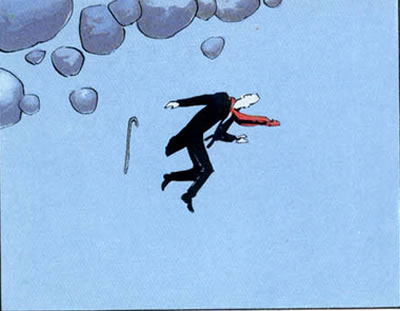
I could do a retrospective on DKR, but honestly, who hasn't read it?
Godzilla: Half Century War didn't exactly set the world on fire when it came out; that's okay. It's not a cape comic, it's a really wiggy take on a vintage licensed property. People don't often pick those up just on a whim. But the hardcover and trade are out now, and if you see it at your FLCS...pick it up. Give it a look-through. Appreciate, if nothing else, Stokoe's artwork, the detail that goes into each page, the massive splash pages where giant monsters wrassle and spit elemental energies at each other. It's a thing that comics often miss - the ability to go epic at times. It kinda reminds me, if nothing else, of Walt Simonson's run on Thor. Just like "Nine steps the hero took, striding like a giant..." It's not told in epic poetry, because that's not Stokoe's style, but it is set up like that in that Godzilla is so larger-than-life, it's like seeing a myth in action.

I will say, as far as nostalgia properties go...I wish more of them would get the memo about things like this. I would hope a lot of you have been following the Transformers vs. G. I. Joe comic from the last year, which is fun and awesome in a different way, but I like the fact that G:HCW was able to take such liberties with the property while staying true to its essence. This is what the Godzilla movie should have been; it would have been awesome. But it's a hard sell, for Hollywood. It's part of the reason superhero movies sometimes fail, is that the people creating them seem to completely miss what the whole thing is about (Green Lantern and Amazing Spider-Man, I'm looking at you). See, the thing about G:HCW is there are no origin stories in it. We never really find out where Godzilla comes from; we get a bunch of guest-shots of various famous opponents of the King of All Monsters, but we never get all of their backstories and stuff too. Comics are cyclical and tend to retell the same stories, but the main benefit of established properties like Godzilla is that you can skip all that. People already know who Godzilla is. They don't need a rehash. He doesn't need to become Godzilla, he can just...be. It's like how Nick Fury steps out of the shadows fully formed at the end of Iron Man - it's perfect. Simple, and perfect. That's what you want in these sort of properties. It's what Godzilla: Half-Century War delivers.
+11
Posts
While I see your point about the lack of origin stories making the comic a glorious self-contained work, I would pay large amounts of dollars for a follow-up that includes stories of the A.M.F. between issues #2 and #3.
I really want to see those poor Hazmat guys following around Hedora and how those crazy hippies dealt with Mothra.
I loved the Hazmat guys. The AMF was described as being kind of rock star thrill jockies, these badasses who might not be able to fight monsters, but at least they could ride out the storm better than anyone else and they knew it.
But the Hedorah crew? They were basically terrified all the time. And rightly so.
Half century war rules.
Why I fear the ocean.